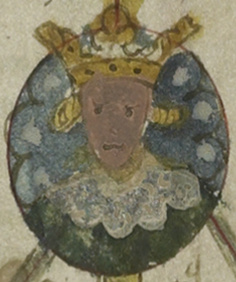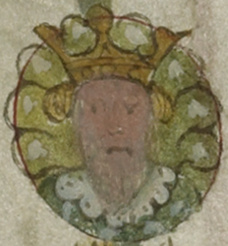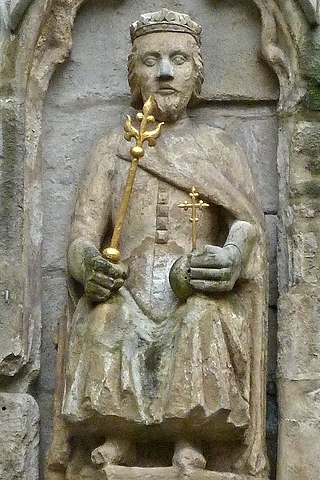Related Research Articles

Ambrosius Aurelianus was a war leader of the Romano-British who won an important battle against the Anglo-Saxons in the 5th century, according to Gildas. He also appeared independently in the legends of the Britons, beginning with the 9th-century Historia Brittonum. Eventually, he was transformed by Geoffrey of Monmouth into the uncle of King Arthur, the brother of Arthur's father Uther Pendragon, as a ruler who precedes and predeceases them both. He also appears as a young prophet who meets the tyrant Vortigern; in this guise, he was later transformed into the wizard Merlin.

Uther Pendragon (Brittonic), also known as King Uther, was a legendary King of the Britons and father of King Arthur.

Cadwaladr ap Cadwallon was king of Gwynedd in Wales from around 655 to 664 or 682. He died in one of two devastating plagues that happened in 664 and in 682. Little else is known of his reign.

Locrinus was a legendary king of the Britons, as recounted by the 12th-century chronicler Geoffrey of Monmouth in his Historia Regum Britanniae. He came to power in 1125BC.
Gwendolen, also known as Gwendolin, or Gwendolyn was a legendary ruler of ancient Britain. She came to power in 1115BC.
Maddan was a legendary king of the Britons as accounted by Geoffrey of Monmouth. He came to power in 1100BC. He was the son of King Locrinus and Queen Gwendolen, who both ruled Britain separately.

Ebraucus was a legendary king of the Britons, as recounted by Geoffrey of Monmouth. He came to power in 1040BC. He was the son of King Mempricius and father of Brutus Greenshield.

Brutus Greenshield was a legendary king of the Britons as accounted by Geoffrey of Monmouth. He was the son of King Ebraucus and came to power in 1001BC.

Cordelia was a legendary Queen of the Britons, as recounted by Geoffrey of Monmouth. She came to power in 855BC.
Sisillius I was a legendary king of the Britons as accounted by Geoffrey of Monmouth. He came to power in 753 BC.

Gorboduc was a legendary king of the Britons as recounted by Geoffrey of Monmouth. He was married to Judon. When he became old, his sons, Ferrex and Porrex, feuded over who would take over the kingdom. Porrex tried to kill his brother in an ambush, but Ferrex escaped to France. With the French king Suhardus, he invaded Britain, but was defeated and killed by Porrex. Porrex was killed in revenge by his own mother Judon, then the high strata of society killed his mother and then there was a war between high strata and low strata leading to an anarchy in the society. This anarchy led to civil war denouncing Gorboduc. Geoffrey does not state when Gorbuduc died, but he is not mentioned after the account of the strife between his sons.
Ferrex was the son of the legendary king Gorboduc of the Britons, and fought with his brother Porrex for the throne, according to Geoffrey of Monmouth.
Dyfnwal Moelmud was accounted as an early king and lawmaker among the Welsh, credited with the codification of their standard units of measure. He also figures as a legendary king of the Britons in Geoffrey of Monmouth's pseudohistorical History of the Kings of the Britons.

Belinus the Great was a legendary king of the Britons, as recounted by Geoffrey of Monmouth. He was the son of Dunvallo Molmutius and brother of Brennius and came to power in 390 BC. He was probably named after the ancient god Belenus.

Brennius was a legendary king of Northumberland and Allobroges, as recounted by Geoffrey of Monmouth. He was the son of Dunvallo Molmutius and brother of Belinus, probably based upon one or both of the historical Brenni. He came to power in 390BC.
Sisillius II was a legendary king of the Britons as recounted by Geoffrey of Monmouth. He came to power in 373BC.

Historia regum Britanniae, originally called De gestis Britonum, is a pseudohistorical account of British history, written around 1136 by Geoffrey of Monmouth. It chronicles the lives of the kings of the Britons over the course of two thousand years, beginning with the Trojans founding the British nation and continuing until the Anglo-Saxons assumed control of much of Britain around the 7th century. It is one of the central pieces of the Matter of Britain.
Arvirargus or Arviragus was a legendary British king of the 1st century AD, possibly based upon a real person. A shadowy historical Arviragus is known only from a cryptic reference in a satirical poem by Juvenal, in which a giant turbot presented to the Roman emperor Domitian is said to be an omen that "you will capture some king, or Arviragus will fall from his British chariot-pole".
Mandubracius or Mandubratius was a king of the Trinovantes of south-eastern Britain in the 1st century BC.

Rowena in the Matter of Britain was the daughter of the purported Anglo-Saxon chief Hengist and wife of Vortigern, "King of the Britons". Presented as a beautiful femme fatale, she won her people the Kingdom of Kent through her treacherous seduction of Vortigern. Contemporary sources are nearly non-existent, so it is impossible to know if she actually existed.